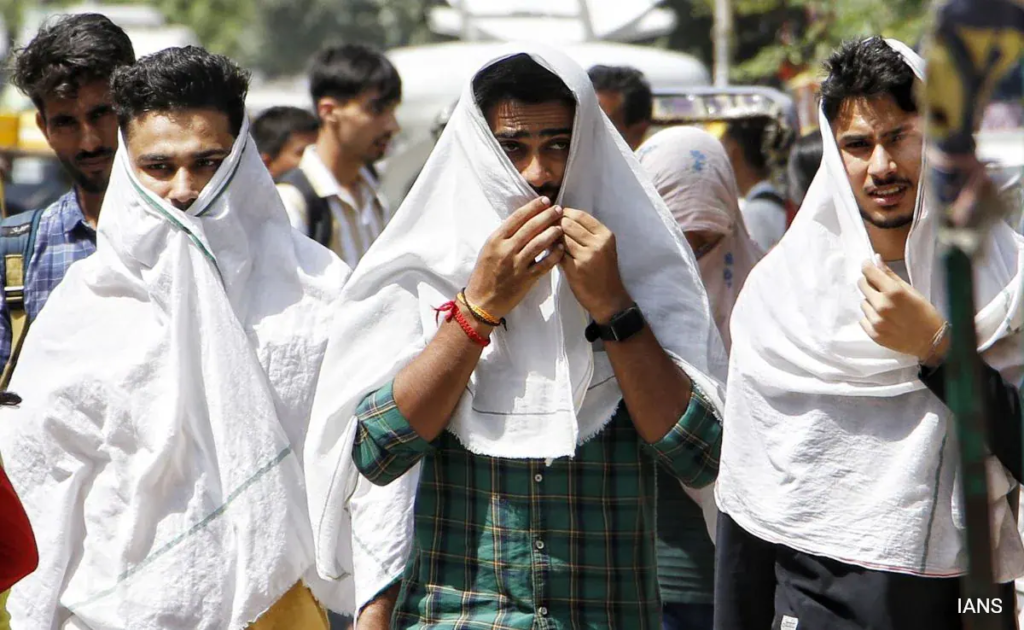Severe Heatwave Warning Issued
Severe-New Delhi: The India Meteorological Department (IMD) has issued an urgent warning regarding a severe heatwave set to grip northwest India over the next five days. This warning also extends to central and east India, where heatwave conditions are anticipated to persist for the next three days. The severe heat conditions are a result of warm winds and high temperatures sweeping across the northern regions of the country.
Severe-Extreme Heat in North India
Delhi’s Najafgarh region recorded a staggering 47.6 degrees Celsius, making it the hottest place in the country. This extreme temperature is not an isolated incident but part of a broader pattern of unusually high temperatures affecting several northern states.
The IMD has marked Rajasthan, Punjab, and Haryana in red, signaling a critical warning and urging residents and authorities to take immediate action to mitigate the impacts of the severe heat. Additionally, parts of eastern Rajasthan and western Uttar Pradesh have been issued an orange alert, advising residents to stay alert and prepare for the high temperatures.

Detailed Weather Forecast
The upcoming days will see persistently high temperatures across these regions. The forecast indicates that:
- Rajasthan: Known for its already hot climate, Rajasthan is expected to experience even more severe temperatures. Cities like Jaipur, Jodhpur, and Udaipur could see temperatures soar above 45 degrees Celsius.
- Punjab and Haryana: Both states, characterized by their agricultural productivity, are now facing challenges due to the oppressive heat. Major cities including Chandigarh, Ludhiana, and Amritsar are likely to witness temperatures above 40 degrees Celsius, affecting daily life and agricultural activities.
- Eastern Rajasthan and Western Uttar Pradesh: These regions are on high alert with orange warnings in place. Cities such as Agra, Aligarh, and Bareilly in Uttar Pradesh and parts of Rajasthan are expected to experience temperatures hovering around 43-45 degrees Celsius.
Health and Safety Measures
In light of these extreme weather conditions, the IMD has recommended several precautionary measures:
- Hydration: It is crucial to stay hydrated by drinking plenty of water throughout the day. Dehydration can set in quickly under such high temperatures.
- Avoid Direct Sunlight: People are advised to avoid going out during the peak heat hours, typically between 11 AM and 4 PM. If it is necessary to be outside, wearing light, loose-fitting clothing and using hats or umbrellas can provide some protection.
- Cool Environments: Staying in cool or air-conditioned environments as much as possible is recommended. Utilizing fans, coolers, or air conditioning units can help in maintaining a cooler indoor temperature.
- Monitor Health: Pay attention to symptoms of heat-related illnesses such as heat exhaustion or heat stroke, which include dizziness, nausea, headache, and extreme thirst. Immediate medical attention should be sought if these symptoms are observed.
- Support Vulnerable Groups: Special care should be taken to protect vulnerable groups such as the elderly, children, and those with pre-existing health conditions. Ensuring they remain hydrated and in cool environments is essential.
Agricultural Impact
The severe heatwave is likely to have significant impacts on agriculture, particularly in the regions under red and orange alerts. Crops such as wheat, pulses, and various fruits and vegetables could suffer from heat stress, leading to reduced yields and potential financial losses for farmers.
Farmers are advised to:
- Irrigation: Increase the frequency of irrigation to combat the effects of extreme heat on crops.
- Mulching: Use mulching techniques to retain soil moisture and protect roots from the intense heat.
- Shade Nets: Employ shade nets to protect sensitive crops from direct sunlight.
- Early Harvesting: If possible, harvest crops early to avoid losses due to heat stress.
Urban Heat Islands
Urban areas are particularly vulnerable to heatwaves due to the Urban Heat Island (UHI) effect, where concrete and asphalt absorb and retain heat, making cities significantly hotter than their rural surroundings.
To mitigate the UHI effect, urban planners and residents are encouraged to:
- Green Spaces: Increase green spaces such as parks and gardens which can help reduce ambient temperatures.
- Reflective Materials: Use reflective materials for roofs and pavements to decrease heat absorption.
- Tree Planting: Planting trees along streets and in residential areas can provide shade and reduce temperatures.
Government and Community Response
Local and state governments are gearing up to tackle the heatwave by:
- Heat Action Plans: Implementing heat action plans that include setting up temporary shelters, distributing water, and running awareness campaigns.
- Public Announcements: Using media channels to continuously update the public about the weather conditions and safety measures.
- Healthcare Facilities: Ensuring healthcare facilities are prepared to handle heat-related emergencies with adequate staffing and supplies.
Long-term Solutions
The recurring nature of severe heatwaves calls for long-term strategies to mitigate their impact. These include:
- Climate-Resilient Infrastructure: Building infrastructure that can withstand extreme temperatures, such as heat-resistant roads and buildings with better insulation.
- Renewable Energy: Investing in renewable energy sources to reduce the overall heat generated by industrial activities and urbanization.
- Water Conservation: Implementing water conservation techniques to ensure a reliable supply of water during heatwaves.
Conclusion
As northwest India braces for a severe heatwave, it is crucial for residents, farmers, and authorities to take proactive measures to mitigate the impact. By staying hydrated, avoiding peak heat hours, and utilizing cooling methods, individuals can protect themselves from the adverse effects of extreme heat. Additionally, the implementation of agricultural practices and urban planning strategies can help reduce the overall impact of heatwaves on society. The government’s preparedness and public cooperation will play a vital role in navigating through this challenging period safely.
